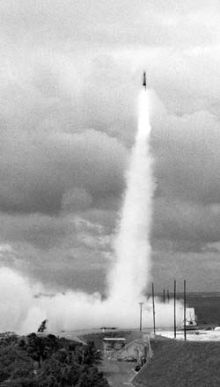The Bush administration has once again cited Ukraine on a list of 15 countries cooperating with the U.S. in regard to its national missile defense system. “Today, 15 countries (including nine in NATO alone) are engaged in missile defense efforts of some kind, whether by hosting key facilities or assets on their territory or actively discussing this possibility, pursuing R&D programs, signing cooperative agreements with the U.S., or maintaining capabilities,” Brian R. Green, deputy assistant secretary of defense for strategic capabilities, told the Senate Armed Services Subcommittee on strategic forces on April 12.
Green said that the list of countries collaborating with the US missile defense program includes Australia, the Czech Republic, Denmark, France, Germany, Italy, Israel, India, Japan, the Netherlands, Poland, Spain, Taiwan, Ukraine, and the U.K, adding that pertinent intergovernmental and interdepartmental agreements have been made with the United Kingdom, Japan, Australia, Israel, and Denmark. The United States is also conducting talks or working on technological efforts with Germany, India, the Netherlands, Spain, Ukraine, and France.
There is no agreement in Ukraine about our country being in any way involved in the US missile defense shield program. In late March President Viktor Yushchenko declared that he did not consider it necessary to speed up Ukraine’s involvement in the US missile defense program. Prime Minister Viktor Yanukovych stated in early March that Ukraine is prepared to make a contribution to developing a global security program. Meanwhile, the anticrisis coalition has taken the toughest stand on this question, opposing Ukraine’s participation in the US missile defense shield project and Washington’s plans concerning the deployment of elements of this project in Ukraine.
“Any statements concerning the possibility of Ukraine’s involvement in US plans relating to the missile defense program do not answer our national interests. The implementation of plans regarding the deployment of any MDP systems in the Czech Republic and Poland constitute a threat to Ukraine’s national security,” reads a resolution adopted by the Verkhovna Rada after a vote by 240 MPs.
The Ukrainian government has been holding consultations with Washington about the Ukrainian defense-production complex’s involvement in the US missile defense program since 2002. During the final round of consultations, held in Kyiv in mid-March, Lieutenant General Henry Obering, the director of the U.S. Missile Defense Agency, said that Ukrainian and US industries could benefit from collaborating within the missile defense framework.
The US deputy defense secretary’s report to the Senate does not mention any details of the Washington-Kyiv talks on the missile defense project, but the document does focus on Russia’s stand on the matter. Green emphasized that Russia “clearly believes in the value of missile defense as it continues to maintain a missile defense system around its major population center, Moscow, and has developed defenses against shorter-range missiles.”
He told the Senate that the Pentagon is conducting talks with Russia in order to draw up a missile defense cooperation agreement on the intergovernmental and interdepartmental levels - also along the lines of NATO-Russia cooperation.
The US deputy defense secretary emphasized that the missile defense systems are “not aimed against Russia” and that their characteristics and deployment would be no protection against ICBMs launched from Russia. Green also said that US officials have repeatedly informed the Russian side about missile defense plans in the course of talks held in Washington, Moscow, Brussels, and elsewhere; and that the United States plans to continue such contacts with Russia in order to find new ways to establish confidence and opportunities for further cooperation in the field of missile defense.
Anatolii SHEVTSOV, head of the Dnipropetrovsk branch of the National Institute for Strategic Studies:
Here one must distinguish between the concepts of work according to its essence and announcements. By itself this announcement does not mean anything. It appears to be one-sided, not thoroughly verified, and has a political subtext. If I were a Pentagon official, I would add Russia to this list, since the Americans have been collaborating with Russia no less than with us. For example, in May 2002 the presidents of the US and Russia signed a memorandum that has provisos which are being implemented: maneuvers, including large-scale ones.
But for some reason Russia is not on this list. Despite its special position, Russia should be included in this list on the same terms. Being included in this list would deprive Russia of the opportunity to accuse other countries. Such announcements bring nothing but harm because they imply confrontation, implying that Ukraine is collaborating and Russia, which has its own opinion, is not. Politically this declaration is not advantageous to us. Such declarations spark an unhealthy reaction on the part of our neighbor, without boosting our role or strengthening our cooperation. Essentially, any kind of cooperation implies advantage. If it is not advantageous, then no one will cooperate.
I think that the smartest position that Ukraine could take in this question should be not to delve into its essence because we may cause trouble for ourselves, especially in the current conditions.








